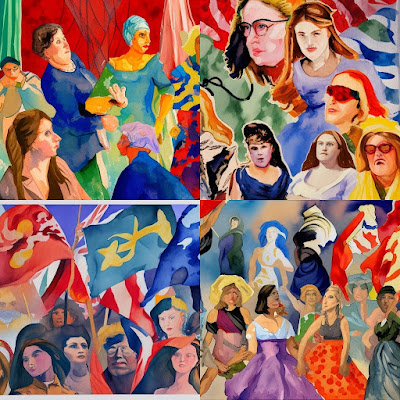Popular Representations of Development (book recommendation)
David Lewis, Dennis Rodgers & Michael Woolcock recently contributed a piece to the Guardian on Why dry academic journals are not the only source on development.
Their reflections are part of a larger project that has now been published in a great new book Popular Representations of Development-Insights from novels, films, television and social media.
Together with my colleague Daniel E. Esser we contributed a chapter to the book on social media, Twitter and global policy summits, based on earlier work on the topic.
Even without the self-promotion the book is a very timely and interesting contribution to the debate on how 'development' is presented, represented & discussed outside the narrow confines of academia and the odd mainstream news article:
Overview over chapters & authors
Part 1: Introduction 1. Popular Representations of Development David Lewis, Dennis Rodgers, and Michael Woolcock
Part 2: Literature and Fiction 2. The Fiction of Development: Literary Representation as a Source of Authoritative Knowledge David Lewis, Dennis Rodgers, and Michael Woolcock 3. Notes on Teaching International Studies With Novels: ‘Hard Times’, ‘Half of a Yellow Sun’ and ‘The Quiet American’ John Harriss 4. Considering ‘Pedagogical’ Fictions and Metanarratives of Development: 1 World Manga Veronica Davidov
Part 3: Media and Television 5. More News is Bad News: Why Studies of ‘the Public Faces of Development’ and ‘Media and Morality' should be concerned with reality TV programmes Martin Scott 6. 'Hidden in Plan Sight': Baltimore, The Wire and the politics of under-development in urban America Simon Parker
Part 4: Film 7. The Projection of Development: Cinematic Representation as An(other) Source of Authoritative of Knowledge? Simon Parker 8. Affective Histories: Imagining Poverty in Popular Indian Cinema Esha Shah
Part 5: Public Campaigns 9. Visual Representations of Development: The Empire Marketing Board Poster Campaign 1926-1933 Uma Kothari 10. Band Aid Reconsidered: Sentimental Cultures and Populist Humanitarianism Cheryl Lousley
Part 6: New Media 11. Blogs + Twitter = Change? Discursive Reproduction of Global Governance and the Limits of Social Media Tobias Denskus and Daniel E. Esser 12. Followme.intdev.com: International Development in the Blogosphere Ryann Manning
Part 7: Conclusion 13. Conclusion: Popular Representations of Development - Taking Stock, Moving Forward David Lewis, Dennis Rodgers, and Michael Woolcock
Their reflections are part of a larger project that has now been published in a great new book Popular Representations of Development-Insights from novels, films, television and social media.
Together with my colleague Daniel E. Esser we contributed a chapter to the book on social media, Twitter and global policy summits, based on earlier work on the topic.
Even without the self-promotion the book is a very timely and interesting contribution to the debate on how 'development' is presented, represented & discussed outside the narrow confines of academia and the odd mainstream news article:
Although the academic study of development is well established, as is also its policy implementation, less considered are the broader, more popular understandings of development that often shape agendas and priorities, particularly in representative democracies.The three editors mention in their introduction an important point that has been guiding my own academic and non-academic writing:
Through its accessible and provocative chapters, Popular Representations of Development introduces the idea that while the issue of ‘development’ – defined broadly as problems of poverty and social deprivation, and the various agencies and processes seeking to address these – is normally one that is discussed by social scientists and policy makers, it also has a wider ‘popular’ dimension. Development is something that can be understood through studying literature, films, and other non-conventional forms of representation. It is also a public issue, one that has historically been associated with musical movements such as Live Aid and increasingly features in newer media such as blogs and social networking. The book connects the effort to build a more holistic understanding of development issues with an exploration of the diverse public sphere in which popular engagement with development takes place.
This collection highlights how if we look beyond conventional academic studies and policy reports - for example to films, posters, or fiction - then we may learn something new. For example, we may find forms of knowledge and representation that humanise development processes, or historicise our perspective in illuminating ways (p.12).With regard to social media and digital development the three editors make an important point in their final conclusion and agenda for future engagement with popular representations of development:
The chapters in this volume are relatively sanguine about the extent to which new social technologies are qualitatively shifting the tone in terms of development debates, but in other circles one frequently hears concrete examples of how mobile phones, tweets etc. are providing a new generation of 'tools' for promoting real-time 'social accountability'. Under what conditions, then, do social media actually accomplish these more noble and ambitious political objectives? (p.248)So lots more to explore, research and write about - but also an invitation to browse through the book, critically review it and stay engaged in critically analysing popular representation of development as discourse, data and debate!
Overview over chapters & authors
Part 1: Introduction 1. Popular Representations of Development David Lewis, Dennis Rodgers, and Michael Woolcock
Part 2: Literature and Fiction 2. The Fiction of Development: Literary Representation as a Source of Authoritative Knowledge David Lewis, Dennis Rodgers, and Michael Woolcock 3. Notes on Teaching International Studies With Novels: ‘Hard Times’, ‘Half of a Yellow Sun’ and ‘The Quiet American’ John Harriss 4. Considering ‘Pedagogical’ Fictions and Metanarratives of Development: 1 World Manga Veronica Davidov
Part 3: Media and Television 5. More News is Bad News: Why Studies of ‘the Public Faces of Development’ and ‘Media and Morality' should be concerned with reality TV programmes Martin Scott 6. 'Hidden in Plan Sight': Baltimore, The Wire and the politics of under-development in urban America Simon Parker
Part 4: Film 7. The Projection of Development: Cinematic Representation as An(other) Source of Authoritative of Knowledge? Simon Parker 8. Affective Histories: Imagining Poverty in Popular Indian Cinema Esha Shah
Part 5: Public Campaigns 9. Visual Representations of Development: The Empire Marketing Board Poster Campaign 1926-1933 Uma Kothari 10. Band Aid Reconsidered: Sentimental Cultures and Populist Humanitarianism Cheryl Lousley
Part 6: New Media 11. Blogs + Twitter = Change? Discursive Reproduction of Global Governance and the Limits of Social Media Tobias Denskus and Daniel E. Esser 12. Followme.intdev.com: International Development in the Blogosphere Ryann Manning
Part 7: Conclusion 13. Conclusion: Popular Representations of Development - Taking Stock, Moving Forward David Lewis, Dennis Rodgers, and Michael Woolcock





Comments
Post a Comment